What Are the Cost Implications of Domain-Specific LLM Development in 2025?
In today’s fast-paced digital landscape, businesses are constantly seeking tools to streamline operations and enhance performance. ChatGPT, a powerful AI tool, offers a versatile solution that can transform daily workflows, improve decision-making, and drive productivity across departments. With its ability to automate routine tasks, generate insightful responses, and support customer interactions, ChatGPT reduces the burden on human teams, allowing them to focus on higher-value activities.
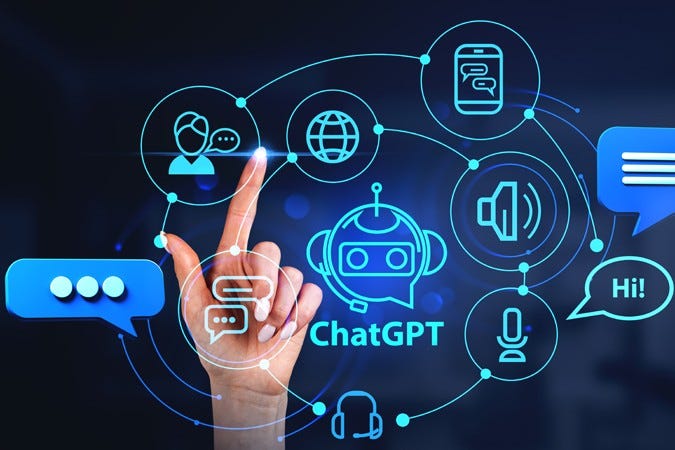
This AI can quickly process vast amounts of data, uncovering actionable insights that inform smarter business strategies and optimize processes. Whether used to enhance customer service, refine marketing campaigns, or boost internal communication, ChatGPT provides businesses with a scalable, adaptable resource to meet evolving operational demands. Its integration into business operations leads to cost savings, improved accuracy, and faster turnaround times, creating a more agile and competitive organization. For companies looking to stay ahead, ChatGPT offers a strategic advantage, transforming traditional processes into efficient, data-driven solutions that meet modern business needs.
Table of ContentWhat is ChatGPT?Understanding ChatGPT’s Core Functionalities
Key Benefits of Using ChatGPT in Business Operations
How ChatGPT Enhances Decision-Making Processes?
How Is ChatGPT A Game-Changer For Business Operations?
Use Cases Across Various Industries
Overcoming Common Challenges with ChatGPT Implementation
Future Trends and Developments in ChatGPT for Business
Conclusion
FAQsWhat is ChatGPT?
ChatGPT is an advanced conversational AI developed by OpenAI, based on the GPT (Generative Pre-trained Transformer) architecture. It utilizes deep learning techniques to understand and generate human-like text based on the input it receives. This powerful tool can engage in meaningful conversations, answer questions, provide information, and assist with a wide range of tasks, making it useful across various industries. ChatGPT is designed to learn from large datasets, allowing it to generate contextually relevant responses and adapt to different conversational styles.
Its applications include customer support, content creation, education, and personal assistance, among others. By enabling more efficient communication and streamlining workflows, ChatGPT app development helps businesses enhance operational performance and deliver a better user experience, ultimately transforming how organizations interact with their customers and teams.
Understanding ChatGPT’s Core FunctionalitiesChatGPT’s core functionalities are designed to make interactions with AI as natural and efficient as possible. Here’s a breakdown of its main features:
1. Natural Language Processing (NLP)ChatGPT uses NLP to understand and generate human-like responses in conversation. It parses user input to grasp context, sentiment, and intent, then crafts coherent replies that match the conversation’s tone and direction.
2. Context AwarenessChatGPT can remember information within a conversation, helping it keep track of ongoing topics, user preferences, and previous questions. This makes it well-suited for tasks requiring continuity, such as providing personalized advice or developing detailed plans over multiple exchanges.
3. Language GenerationWith advanced language generation capabilities, ChatGPT can create diverse content ranging from casual text to professional copywriting. This flexibility makes it a powerful tool for creating blog posts, emails, and social media content in various tones and formats.
4. Task-Specific AssistanceChatGPT can be customized or “fine-tuned” for industry-specific applications, from customer support to technical troubleshooting. Tailoring ChatGPT for specific tasks enhances its utility by adapting it to common queries, terminology, and processes specific to an organization or field.
5. Learning and ImprovementAs ChatGPT continues to be trained on new data, it becomes increasingly proficient. While it doesn’t learn in real-time during user interactions, its periodic updates allow it to integrate new information, improving its accuracy and breadth of knowledge.
These core functionalities make ChatGPT a versatile tool across industries, whether it’s used for enhancing customer engagement, streamlining internal communication, or powering virtual assistants.
Key Benefits of Using ChatGPT in Business OperationsUsing ChatGPT in business operations can drive efficiency, improve customer engagement, and open new avenues for innovation. Here’s a closer look at the benefits ChatGPT brings to organizations:
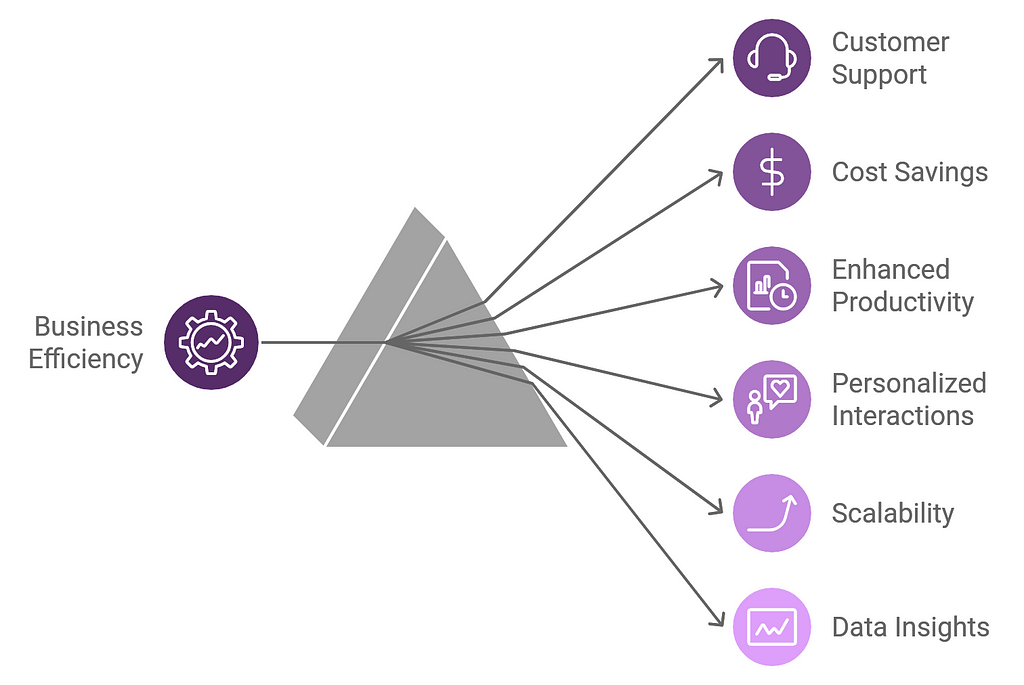 1. 24/7 Customer Support
1. 24/7 Customer SupportChatGPT can provide instant, around-the-clock support, answering FAQs, processing inquiries, and handling common customer issues. This not only reduces customer wait times but also lightens the load on human support staff, who can then focus on more complex issues.
2. Cost SavingsBy automating repetitive tasks, ChatGPT helps businesses save on operational costs. Tasks like order tracking, appointment scheduling, and basic troubleshooting can be handled efficiently without needing dedicated staff, cutting down on labor expenses.
3. Enhanced ProductivityChatGPT can serve as a virtual assistant, helping employees with quick answers, document drafting, research, and organizing tasks. It saves time for employees, allowing them to focus on higher-value work, which boosts productivity across the organization.
4. Personalized Customer InteractionsBy leveraging ChatGPT’s context awareness, companies can deliver a more personalized experience to customers. ChatGPT can remember preferences and provide tailored recommendations, making customers feel valued and increasing engagement.
5. ScalabilityUnlike traditional customer service teams that require hiring and training for scale, ChatGPT can handle increased customer interactions without additional overhead. This makes it easy to manage higher volumes during peak seasons or as the business grows.
6. Data-Driven InsightsChatGPT can analyze and summarize customer conversations, identifying trends, common complaints, and feedback. These insights allow businesses to proactively improve their products, services, and overall customer experience.
7. Marketing and Content CreationChatGPT’s language generation capabilities make it a powerful tool for creating marketing materials, from social media posts to blog articles. It can adapt to different tones and styles, helping marketing teams produce consistent, engaging content more quickly.
8. Improved Decision MakingChatGPT can assist in research and reporting by gathering and summarizing large volumes of information. This helps business leaders make informed decisions faster, especially when they need to process complex data or industry trends.
9. Employee Training and DevelopmentChatGPT can serve as a learning tool for employees, answering questions, explaining procedures, and guiding new hires through onboarding materials. This accelerates learning and provides a consistent knowledge base for employees at any level.
10. Flexibility and CustomizationChatGPT can be tailored to suit specific business needs, such as industry-specific language, compliance requirements, or customized workflows. This makes it a versatile solution for companies in various sectors, from healthcare to finance.
By integrating ChatGPT into business operations, organizations can achieve greater efficiency, deliver enhanced customer experiences, and stay competitive in a technology-driven marketplace.
How ChatGPT Enhances Decision-Making Processes?ChatGPT can be a powerful tool for enhancing decision-making processes in business, primarily by streamlining information gathering, offering data-driven insights, and generating well-structured responses that help leaders make informed, timely decisions. Here’s how:
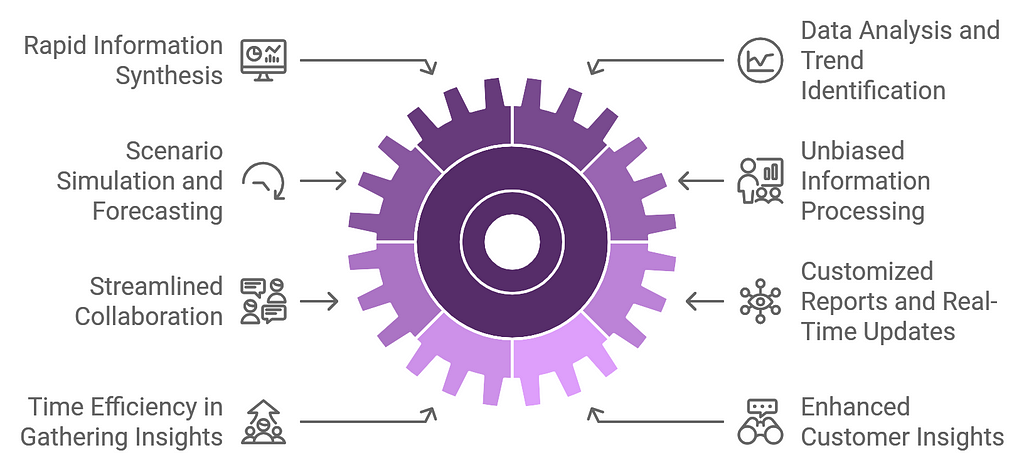 1. Rapid Information Synthesis
1. Rapid Information SynthesisChatGPT can quickly process large volumes of information, summarizing key insights from research, reports, and real-time data. Consolidating relevant details into digestible formats, allows decision-makers to understand complex topics without needing to manually sift through extensive resources.
2. Data Analysis and Trend IdentificationChatGPT can assist with identifying trends from historical data, customer feedback, and market research. This enables businesses to spot emerging opportunities, risks, and patterns in customer behavior, empowering leaders to make proactive decisions based on real-time analytics.
3. Scenario Simulation and ForecastingUsing data inputs, ChatGPT can simulate potential scenarios and project possible outcomes, helping leaders evaluate options and predict the impact of their decisions. This forecasting capability aids in preparing for different outcomes, which is especially valuable in strategic planning and risk management.
4. Unbiased Information ProcessingChatGPT can objectively present data and insights without personal bias, allowing leaders to make choices based on factual information. Reducing cognitive biases supports clearer decision-making and encourages data-driven approaches.
5. Streamlined CollaborationChatGPT can serve as a collaborative tool, summarizing discussions, creating shared knowledge bases, and assisting in document drafting. This simplifies communication within teams, especially when working on complex projects that require input from multiple departments.
6. Customized Reports and Real-Time UpdatesChatGPT can generate tailored reports, highlighting metrics and KPIs that are crucial for decision-making. These reports can be customized for frequency and depth, ensuring leaders have up-to-date information on demand to assess performance or market conditions.
7. Time Efficiency in Gathering InsightsChatGPT can accelerate the process of gathering and interpreting information, allowing leaders to spend more time on strategic thinking rather than on repetitive tasks. This efficiency is crucial in fast-paced environments where timely decision-making can be a competitive advantage.
8. Enhanced Customer InsightsBy analyzing customer interactions, ChatGPT can generate insights into customer needs, preferences, and satisfaction levels. This allows businesses to make data-driven decisions on product improvements, service adjustments, and marketing strategies.
9. Learning and Adaptation Over TimeChatGPT can be periodically updated with new industry data, regulations, and best practices, helping it stay relevant to evolving decision-making needs. This adaptability ensures that business decisions are always informed by the latest knowledge and trends.
10. Risk and Compliance ManagementChatGPT can assist in identifying compliance requirements and potential legal risks, providing information on industry standards and regulatory updates. This helps decision-makers avoid costly compliance issues and maintain accountability in complex regulatory environments.
By embedding ChatGPT in the decision-making process, organizations can ensure that their choices are backed by reliable data, timely insights, and comprehensive analyses, leading to more strategic, well-informed business decisions.
How Is ChatGPT A Game-Changer For Business Operations?ChatGPT represents a transformative force in business operations, offering capabilities that enhance efficiency, drive innovation, and improve customer engagement. Here’s how ChatGPT is a game-changer for businesses:
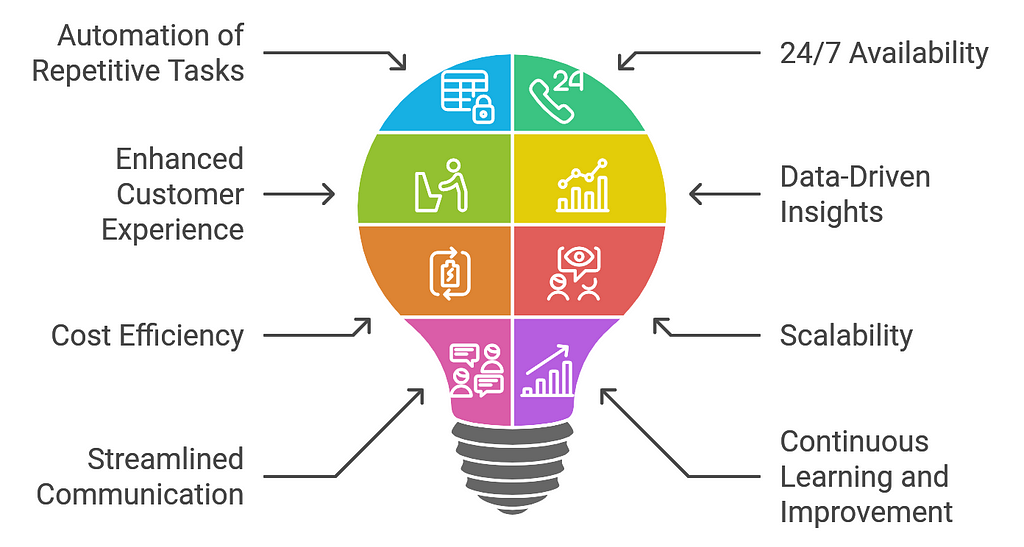 1. Automation of Repetitive Tasks
1. Automation of Repetitive Tasks- ChatGPT can handle routine inquiries, appointment scheduling, and data entry, automating tasks that consume valuable employee time. This allows teams to focus on more strategic and high-value activities, boosting overall productivity.
- With ChatGPT, businesses can provide round-the-clock customer support. This ensures that customer queries are addressed promptly, regardless of time zones, leading to higher satisfaction and retention rates.
- ChatGPT delivers personalized interactions by analyzing user data and preferences. By offering tailored recommendations and support, businesses can create a more engaging customer experience, fostering loyalty and long-term relationships.
- By analyzing customer interactions and feedback, ChatGPT can generate valuable insights into consumer behavior and market trends. This data-driven approach enables businesses to make informed decisions, optimize strategies, and identify new opportunities.
- Automating customer service and other operational processes with ChatGPT reduces the need for extensive human resources, leading to significant cost savings. Organizations can allocate budgets more effectively and invest in areas that drive growth.
- ChatGPT can handle a large volume of interactions simultaneously, making it easy for businesses to scale operations without proportionately increasing resources. This is especially beneficial during peak seasons or rapid growth phases.
- ChatGPT facilitates seamless communication between teams and departments. Providing instant access to information and resources enhances collaboration and ensures that employees can work efficiently together.
- As ChatGPT evolves through updates and learning from interactions, it continuously improves its responses and capabilities. This means businesses benefit from a system that becomes more effective and sophisticated over time.
- ChatGPT can assist employees by providing quick answers to questions, offering training resources, and facilitating onboarding processes. This supports staff development and ensures that employees are equipped with the knowledge they need to excel.
- The integration of ChatGPT into operations can inspire new ways of doing business. Companies may develop innovative products and services around AI capabilities, creating unique value propositions and differentiating themselves in the market.
- ChatGPT’s ability to analyze data and generate reports helps business leaders make informed decisions quickly. By providing actionable insights, it enables organizations to respond proactively to market changes and internal challenges.
- ChatGPT’s versatility allows it to be adapted for various industries, from healthcare to finance to retail. This cross-industry applicability means that organizations can leverage their capabilities to meet their specific needs and challenges.
- In times of crisis, ChatGPT can assist businesses in managing communication with customers and employees, providing real-time updates, and addressing concerns effectively. This ensures that organizations can maintain trust and transparency during challenging situations.
By leveraging these capabilities, ChatGPT empowers businesses to optimize their operations, enhance customer engagement, and drive innovation, ultimately positioning them for long-term success in a competitive landscape. Its transformative potential makes it an essential tool for modern business practices.
Use Cases Across Various IndustriesChatGPT has versatile applications across different industries, enhancing processes, improving customer engagement, and driving innovation. Here are some key use cases across various sectors:
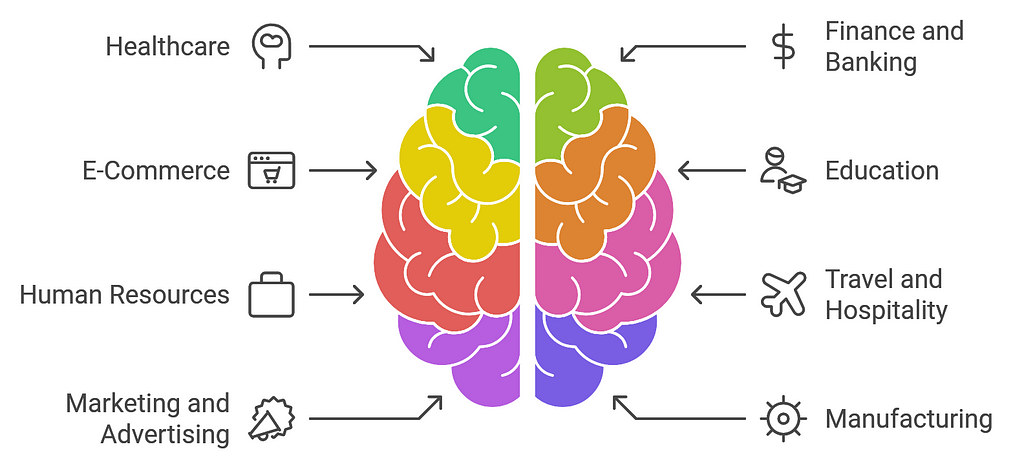 1. Healthcare
1. Healthcare- Patient Support: ChatGPT can answer common patient queries about symptoms, medications, and appointment scheduling, providing instant support and freeing up staff for more complex issues.
- Medical Documentation: It can assist healthcare providers by generating clinical documentation and summarizing patient interactions, saving time and improving accuracy.
- Telehealth: ChatGPT can facilitate virtual consultations by triaging patient concerns and collecting initial information before connecting them with healthcare professionals.
- Customer Service: Financial institutions use ChatGPT for handling inquiries related to account management, transactions, and financial products, providing quick and efficient service.
- Fraud Detection: By analyzing transaction patterns and user behaviors, ChatGPT can assist in identifying potential fraudulent activities and alerting the appropriate teams.
- Financial Advising: ChatGPT can provide personalized financial advice based on user input, helping customers with budgeting, investing, and savings strategies.
- Product Recommendations: By analyzing customer preferences and behavior, ChatGPT can offer personalized product suggestions, enhancing the shopping experience.
- Order Tracking: ChatGPT can assist customers in tracking their orders and resolving issues related to deliveries, improving satisfaction and retention.
- Customer Feedback Analysis: It can analyze customer reviews and feedback to identify trends and areas for product improvement or development.
- Tutoring and Learning Support: ChatGPT can provide explanations and assistance on various subjects, helping students with homework and exam preparation.
- Course Development: Educators can use ChatGPT to generate course content, quizzes, and lesson plans tailored to specific learning outcomes.
- Administrative Support: ChatGPT can assist educational institutions in managing student inquiries, enrollment processes, and academic advising.
- Recruitment Assistance: ChatGPT can screen resumes, conduct preliminary interviews, and answer candidate questions about job openings and company culture.
- Employee Onboarding: It can guide new hires through onboarding processes, providing information on policies, procedures, and training resources.
- Employee Engagement: ChatGPT can facilitate anonymous employee feedback and engagement surveys, helping HR teams understand and improve workplace culture.
- Travel Planning: ChatGPT can assist customers in planning trips by providing recommendations for destinations, accommodations, and activities based on preferences and budgets.
- Booking Assistance: It can handle inquiries related to reservations, cancellations, and changes, streamlining the booking process for travelers.
- Customer Support: ChatGPT can address common travel-related queries, such as visa requirements, travel advisories, and itinerary changes.
- Content Creation: Marketers can use ChatGPT to generate blog posts, social media content, and advertising copy, enhancing their content strategy.
- Market Research: It can analyze consumer sentiment and trends based on social media interactions, helping companies refine their marketing strategies.
- Email Campaigns: ChatGPT can assist in crafting personalized email marketing campaigns, improving engagement and conversion rates.
- Supply Chain Optimization: ChatGPT can help in monitoring supply chain logistics, providing insights into inventory management and demand forecasting.
- Employee Training: It can deliver training content and resources to employees, ensuring they are informed about safety protocols and operational procedures.
- Maintenance Scheduling: ChatGPT can assist in scheduling equipment maintenance and generating alerts for necessary repairs, minimizing downtime.
- Property Listings: Real estate agents can use ChatGPT to generate compelling property descriptions and marketing materials for listings.
- Client Communication: It can facilitate communication with clients, answering questions about properties and guiding them through the buying or renting process.
- Market Analysis: ChatGPT can analyze real estate market trends and provide insights on pricing and demand in specific areas.
- Document Drafting: Legal professionals can use ChatGPT to draft contracts, agreements, and other legal documents efficiently.
- Legal Research: ChatGPT can assist in researching case law, statutes, and regulations, helping lawyers prepare for cases more effectively.
- Client Consultation: It can provide preliminary legal advice based on user inquiries, helping clients understand their options before consulting with an attorney.
These use cases illustrate the flexibility and value of ChatGPT across various sectors, highlighting its potential to enhance operations, improve customer satisfaction, and drive innovation in business processes.
Overcoming Common Challenges with ChatGPT ImplementationImplementing ChatGPT can unlock significant benefits, but it also presents some common challenges that businesses need to address for successful integration. One primary hurdle is data privacy; businesses must ensure that sensitive data is protected when using AI tools, requiring robust data handling policies and compliance with privacy regulations. Additionally, there can be initial resistance from teams unfamiliar with AI technology, highlighting the importance of training and clear communication about ChatGPT’s role in augmenting not replacing human jobs.
Another challenge is integrating ChatGPT seamlessly with existing systems; technical compatibility and API integration are essential to make the most of its features. Companies may also encounter difficulty in fine-tuning ChatGPT for industry-specific applications, which requires ongoing customization to achieve the best results.
To overcome these obstacles, businesses should start with a phased implementation approach, setting clear goals and monitoring performance. By proactively addressing these challenges, companies can unlock ChatGPT’s full potential, enhancing operational performance and establishing a foundation for ongoing AI-driven innovation.
Future Trends and Developments in ChatGPT for BusinessThe future of ChatGPT in business is poised for significant advancements as technology evolves and organizations increasingly adopt AI-driven solutions. Here are some key trends and developments expected to shape the role of ChatGPT in business:
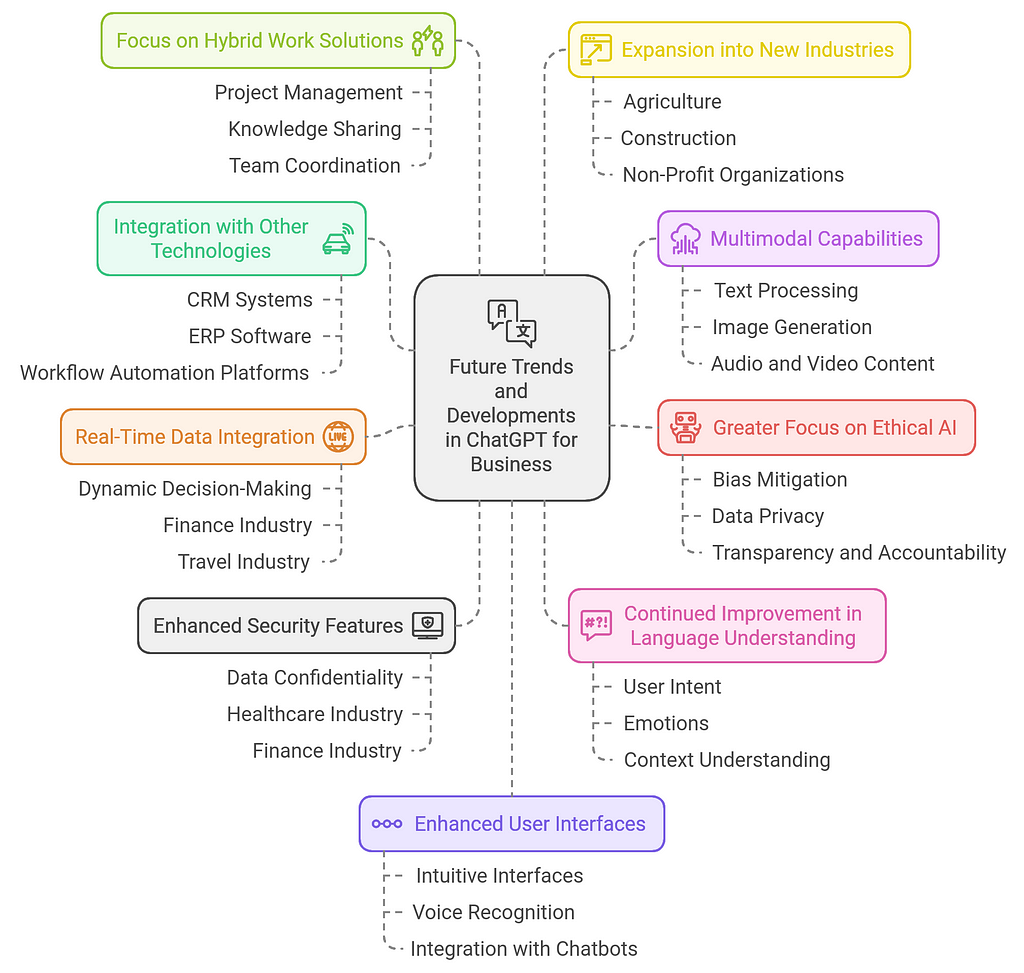 1. Increased Customization and Personalization
1. Increased Customization and Personalization- Businesses will likely seek more tailored AI solutions to meet specific operational needs. Future iterations of ChatGPT may offer customizable features, allowing organizations to train the model on proprietary data and industry-specific jargon, enhancing relevance and accuracy in responses.
- ChatGPT is expected to integrate more seamlessly with other business tools, such as Customer Relationship Management (CRM) systems, Enterprise Resource Planning (ERP) software, and workflow automation platforms. This will enable a more cohesive approach to managing customer interactions, data, and operations.
- Future versions of ChatGPT are likely to demonstrate enhanced contextual awareness, enabling them to maintain context over longer conversations and across multiple interactions. This will lead to more natural and fluid conversations, improving user experience and satisfaction.
- As AI technology advances, ChatGPT may evolve to process and generate not just text but also images, audio, and video content. This multimodal functionality could broaden its applications in fields like marketing, training, and customer support.
- As concerns about bias, data privacy, and AI ethics continue to grow, there will be increased emphasis on developing ethical guidelines for AI usage. Future ChatGPT models may incorporate robust mechanisms for ensuring fairness, transparency, and accountability in decision-making processes.
- Future developments may allow ChatGPT to access real-time data feeds, enabling it to provide up-to-date information for dynamic decision-making. This capability would be particularly valuable in industries like finance, travel, and e-commerce, where conditions change rapidly.
- As businesses become more cautious about data security, future iterations of ChatGPT will likely incorporate advanced security protocols to protect sensitive information during interactions. This will be crucial for industries like healthcare and finance, where data confidentiality is paramount.
- Ongoing research in natural language processing will further enhance ChatGPT’s language comprehension and generation capabilities. This could lead to a more nuanced understanding of user intent, emotions, and context, resulting in richer and more human-like interactions.
- As hybrid work environments become more common, ChatGPT can play a crucial role in facilitating communication and collaboration among remote teams. Future developments may include features specifically designed for project management, knowledge sharing, and team coordination.
- As organizations recognize the potential of AI in various sectors, ChatGPT will likely find applications in industries not traditionally associated with AI, such as agriculture, construction, and non-profit organizations. This expansion will drive innovation and open up new use cases.
- The user experience of interacting with ChatGPT is expected to improve, with more intuitive interfaces, voice recognition capabilities, and integration with chatbots and virtual assistants. This will make it easier for users to interact with AI across different platforms.
- Future ChatGPT models may evolve to provide more sophisticated insights and recommendations based on data analysis. By leveraging machine learning algorithms, they could offer actionable business intelligence, aiding strategic decision-making.
By embracing these trends and developments, businesses can harness the full potential of ChatGPT, improving efficiency, enhancing customer experiences, and driving innovation across their operations. As technology continues to advance, its role in shaping the future of work will be increasingly significant.
ConclusionIncorporating ChatGPT into business operations offers a strategic advantage that drives growth, efficiency, and adaptability. As businesses face increasing demands for speed, accuracy, and customer engagement, ChatGPT’s AI capabilities provide an essential solution. By automating routine tasks and enhancing communication, ChatGPT frees up teams to focus on innovation and complex problem-solving, thus fostering a more productive environment. Its data processing and analytical prowess enable smarter, faster decisions that support more personalized customer experiences and targeted marketing efforts.
Additionally, ChatGPT’s scalability means that businesses of any size can implement its features, making it a flexible choice that grows with organizational needs. The cost savings, operational efficiency, and improved decision-making derived from ChatGPT equip companies to stay competitive in an evolving market. Ultimately, ChatGPT empowers businesses to shift from reactive to proactive strategies, helping them to achieve sustainable success and resilience. Adopting ChatGPT is not just about keeping pace with change it’s about leveraging AI to create a forward-thinking, adaptable enterprise.
FAQs1. What is ChatGPT and how does it work?ChatGPT is an advanced language model developed by OpenAI that uses artificial intelligence to understand and generate human-like text. It processes user inputs and provides relevant responses, making it suitable for a variety of applications, including customer support, content generation, and data analysis.
2. How can ChatGPT improve customer service?ChatGPT can handle a high volume of customer inquiries simultaneously, providing instant responses 24/7. It can answer frequently asked questions, assist with troubleshooting, and guide customers through processes, all of which enhance the overall customer experience and satisfaction.
3. What types of tasks can ChatGPT automate?ChatGPT can automate repetitive tasks such as responding to common inquiries, appointment scheduling, data entry, and generating reports. This frees up employees to focus on more complex and strategic tasks, improving overall productivity.
4. How does ChatGPT contribute to cost savings?By automating customer support and other operational processes, ChatGPT reduces the need for a large customer service team. This leads to lower labor costs and allows businesses to allocate resources more efficiently.
5. Can ChatGPT provide personalized interactions?Yes, ChatGPT can analyze user data and preferences to deliver tailored recommendations and responses. This personalization enhances customer engagement and helps build stronger relationships with clients.
6. How does ChatGPT support decision-making?ChatGPT can analyze data and provide insights based on customer interactions and market trends. By summarizing information and generating reports, it helps business leaders make informed decisions quickly and effectively.
7. Is ChatGPT scalable for growing businesses?Absolutely. ChatGPT can handle an increasing volume of interactions without requiring proportional increases in resources. This scalability is particularly beneficial for businesses experiencing rapid growth or seasonal spikes in demand.
8. How does ChatGPT facilitate team collaboration?ChatGPT can assist in streamlining communication by providing quick access to information, resources, and documentation. This ensures that teams can collaborate efficiently and stay informed on project updates and company policies.
9. What industries can benefit from ChatGPT?ChatGPT is versatile and can be adapted for various industries, including healthcare, finance, e-commerce, education, and more. Its applications range from customer support to content generation, making it relevant across different sectors.
10. What are the security considerations when using ChatGPT?While ChatGPT can enhance operational performance, businesses must implement security measures to protect sensitive data. This includes ensuring data privacy, using encryption, and regularly monitoring interactions to mitigate risks associated with AI technology.
Why Should Businesses Use ChatGPT for Enhanced Operational Performance? was originally published in Coinmonks on Medium, where people are continuing the conversation by highlighting and responding to this story.
